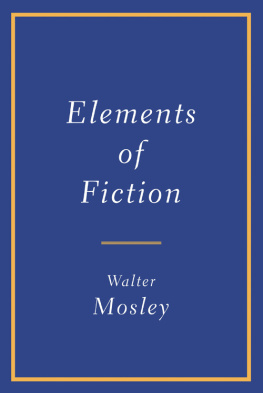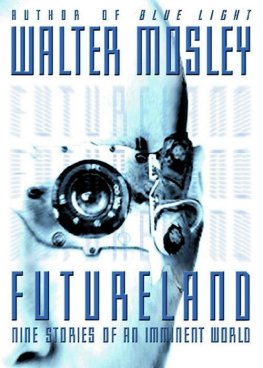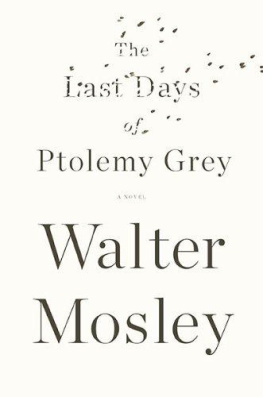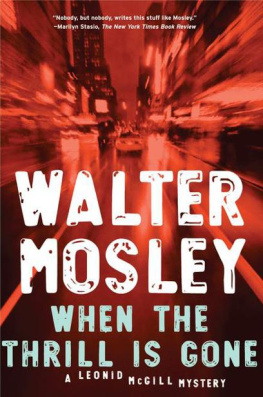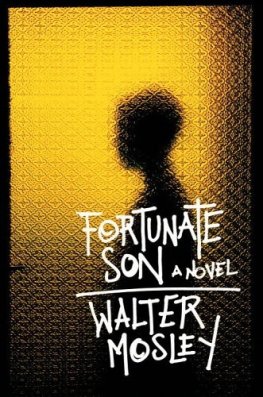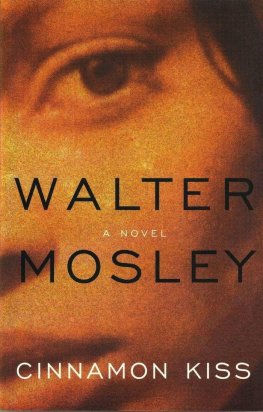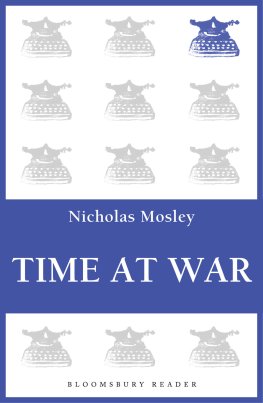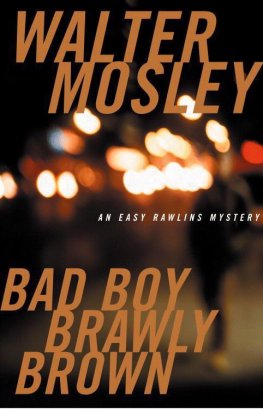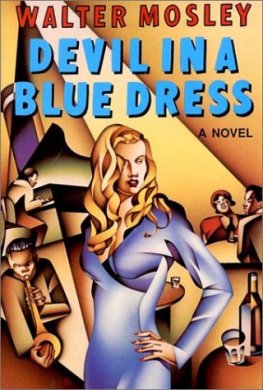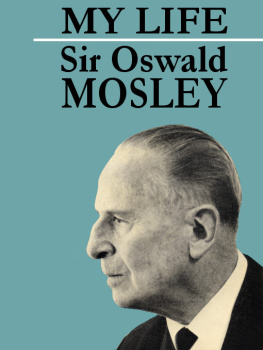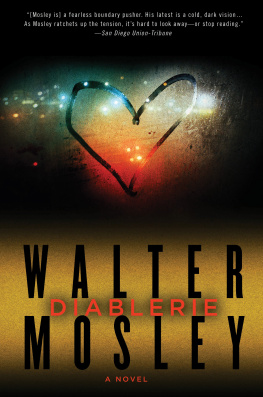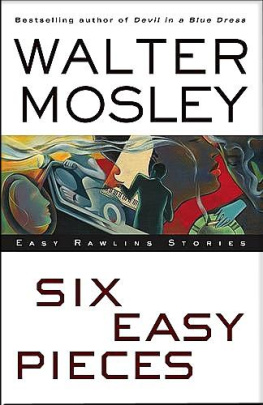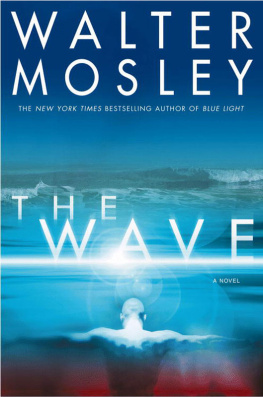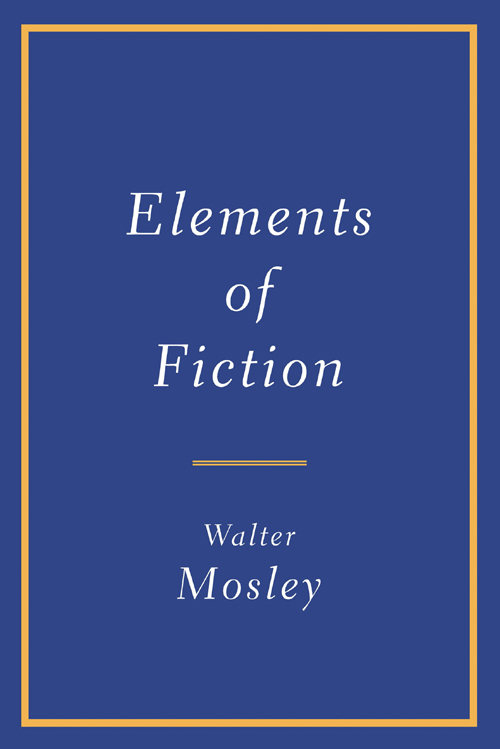Elements of Fiction
Walter
Mosley

Copyright 2019 by Thing Itself, Inc.
Cover design by Julianna Lee
Lying in a Hammock at William Duffys Farm in Pine Island, Minnesota from The Branch Will Not Break 1963 by James Wright.
Published by Wesleyan University Press and reprinted with permission.
All rights reserved. No part of this book may be reproduced in any form or by any electronic or mechanical means, including information storage and retrieval systems, without permission in writing from the publisher, except by a reviewer, who may quote brief passages in a review. Scanning, uploading, and electronic distribution of this book or the facilitation of such without the permission of the publisher is prohibited. Please purchase only authorized electronic editions, and do not participate in or encourage electronic piracy of copyrighted materials. Your support of the authors rights is appreciated. Any member of educational institutions wishing to photocopy part or all of the work for classroom use, or anthology, should send inquiries to Grove Atlantic, 154 West 14th Street, New York, NY 10011 or permissions@groveatlantic.com.
FIRST EDITION
Published simultaneously in Canada
First Grove Atlantic eBook edition: September 2019
Library of Congress Cataloguing-in-Publication data available for this title.
ISBN 978-0-8021-4763-9
eISBN 978-0-8021-4764-6
Grove Press
an imprint of Grove Atlantic
154 West 14th Street
New York, NY 10011
Distributed by Publishers Group West
This book is dedicated to the memory of
John Singleton.
One of the most original and creative individuals
I have ever known.
Easy Rawlins Mysteries
Charcoal Joe
Rose Gold
Little Green
Blonde Faith
Cinnamon Kiss
Little Scarlet
Six Easy Pieces
Bad Boy Brawly Brown
A Little Yellow Dog
Gone Fishin
Black Betty
White Butterfly
A Red Death
Devil in a Blue Dress
Leonid McGill Mysteries
And Sometimes I Wonder about You
All I Did Was Shoot My Man
When the Thrill Is Gone
Known to Evil
The Long Fall
Other Fiction
Debbie Doesnt Do It Anymore
Stepping Stone / Love Machine
Merge / Disciple
The Gift of Fire / On the Head of a
Pin
The Last Days of Ptolemy Grey
The Tempest Tales
The Right Mistake
Diablerie
Killing Johnny Fry
Fear of the Dark
Fortune Son
The Wave
47
The Man in My Basement
Fear Itself
Futureland: Nine Stories of
an Imminent World
Fearless Jones
Walkin the Dog
Blue Light
Always Outnumbered, Always
Outgunned
RLs Dream
John Woman
Down the River Unto the Sea
Inside a Silver Box
Original Ebooks
Parishioner
Odyssey
The Further Adventures of Tempest Landry
Nonfiction
Folding the Red into the Black
The Graphomaniacs Primer
12 Steps toward Political Revelation
This Year You Write Your Novel
Life Out of Context
What Next: A Memoir toward
World Peace
Workin on the Chain Gang
Plays
The Fall of Heaven
This monograph is concerned with the hope of writing a novel that transcends story in such a way as to allow the writer to plumb the depths of meaning while, at the same time, telling a good yarn. It is not a manual offering prescribed steps that will inevitably lead to the writing of the perfect story. Rather, the intent of this essay is to explore the internal makeup of the elements of fiction writing. These elements are, among other things: character and character development, plot and story, Voice and narrative, context and description, content and the blank page and, of course, intentional structure versus vast troves of unconscious material.
Considering the goal of this essay and the nonlinear relationships of the elements of fiction, I have decided to approach the subject in a contemplative rather than a systematized form. That is to say, I do not believe there is a road map to Successville in fiction writing. There is no consistent rule to measure the level of achievement. Even if the author is happy with her work that doesnt mean she has done her best. Beginning, middle, and end are meaningless if you arent, at least in some small way, breaking new ground.
For the serious writer these challenges may seem capricious, erratic, and intimidatinglike some unfamiliar opponent in a combat ring of their choosing. The goal of the writer in this contest is the survival of the story in its ideal form. The goal of the story is the impossible brass ring of freedom. Neither rival can achieve absolute victory but they can failin some cases spectacularly.
Luckily for us and our work, failure is an essential raw material from which our stories arise. Failure encompasses the negative spaces of our tales; it guides us, teaches us, it loves our intentions better than any ambition. Failure makes our stories stronger while allowing humility to flow in our hearts.
Fiction is one of the few constructive human activities in which we have the potential to make something from almost nothing. Something from nothing. That kind of alchemy is a recipe for failure and also the hope for the miraculous.
When I say nothing I mean there is little to no physical material used in the creation of our tales. The author might just be an elder making up a story about a wolf and a little girl for the grandchildren on a rainy day when the larder is low. All the storyteller needs are words, imagination, and lovenot necessarily in that order. These materials have a scant physical footprint. The story told might change every day, and the children might, probably will, remember a very different fable.
Something from nothing.
The plentifully available natural resources for fiction are found in language and the capacity for in-articulation, the senses and their continual reevaluation of the world we live in and imagine, and experience, which we glean from both conscious and unconscious sources, through reliable and unreliable recollections.
Theres one last thing to say before we get into the main body of this disquisition, and that iscondensation. Even though I havent used this word in the main body of the text, it is a major unspoken element of fiction writing. Thats how you write a novel: you take a small section of the larger world (for example, retired cop culture in Saint Louis) and then crush the subject down to only those elements that are salient to the story being told. Once youve achieved this end you add as little of the commonplace as possible to make a story that seems large and real and pedestrian and, hopefully, revealing. The middle-aged ex-cops of Saint Louis become the readers entire worldas large as, larger than, their minds can comprehend at any given moment. Thats what our experience of the world is. Good novels are the same.

